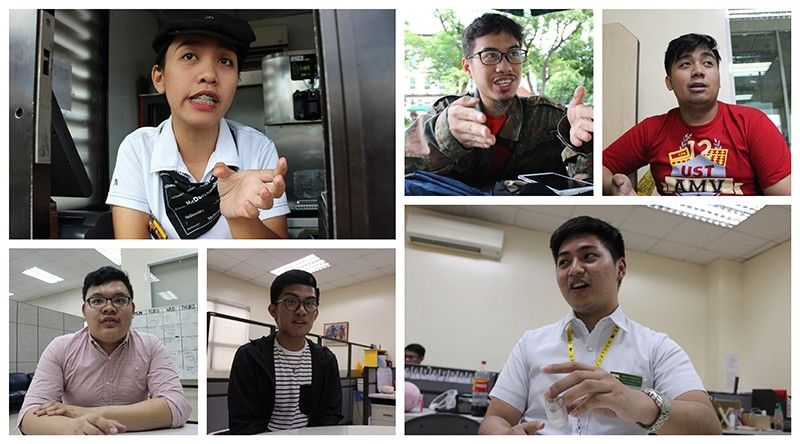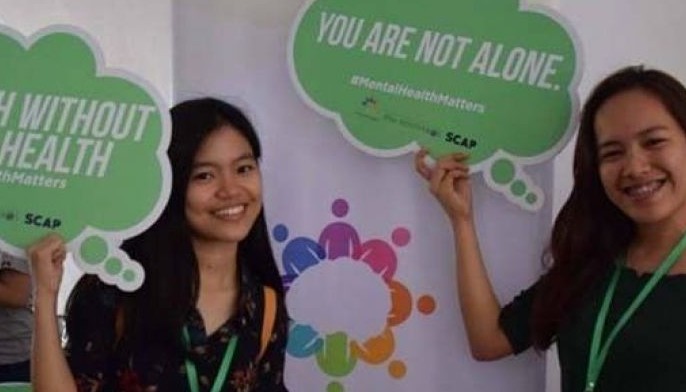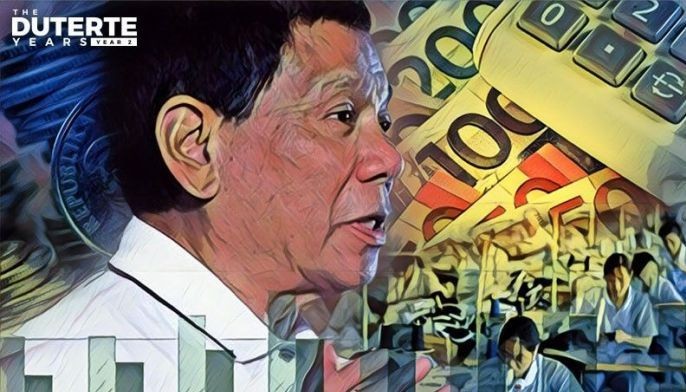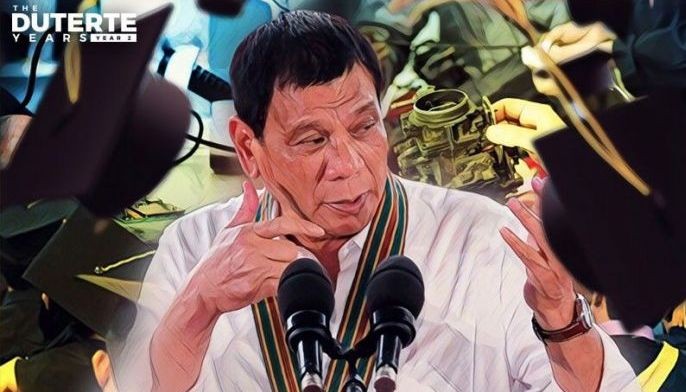'Little hope': Filipino youth share SONA wishlist for Duterte

Lovely Joy Cruz was just 17 when she was forced to look for a job to finance her studies.
Her parents left her in unexpected circumstances. Lovely's father died of diabetes during her last year in high school. Barely a year after her father died, her mother suddenly left their home and have not heard from her since.
Lovely’s trials did not stop there. Because she was a minor, she found it difficult to look for a job. Her aunt and her sister gave her financial assistance she needed to finish high school and her first year in college.
Now in her senior year as a business administration student at a state-run university, Lovely has to juggle her responsibilities as a student and a service crew in a fast food chain. She hopes President Rodrigo Duterte will talk about his plans for struggling working students like her during his third state of the nation address on July 23.
"Studying in state colleges doesn't spare you from paying... As students, we have projects and school activities (that) sometimes demand huge amounts of money…We have to think about those (working students) who really can't afford to pay those projects and paper work,” the 20-year-old working student said.
Lovely is one of the young Filipinos who want to hear the president discuss their issues during his SONA. Officials have said the president would “speak from the heart” as he delivers his 35-minute address.
While it is widely expected that Duterte would devote much time to his usual talking points on illegal drugs, terrorism, corruption and federalism, young people hope that he will also outline an agenda for the youth, which constitute about a fifth of the Philippines’ population.
Duterte: The youth is Philippines' capital
In previous speeches, Duterte claimed that his policies, including his brutal crackdown on narcotics, seek to protect the Philippines’ next generation. The 73-year-old leader threatened to kill drug lords and pushers who “destroy” the youth of the country. He also views young people as the “capital” of the Philippines and expects them to take care of the older generation.
The president has also signed into law measures that seek to promote the welfare of the youth. These include the free college education act that is benefitting three million college students; the anti-hazing law which bans all forms of hazing by fraternities and similar groups; and the mental health law, which requires PhilHealth to provide insurance packages to patients with mental disorders.
Some youth leaders, however, believe the president should do more to provide the needs and to protect the rights of young Filipinos.
Pro-poor policies
Romeo Latoza, a finalist of this year’s Ten Outstanding Students of the Philippines, said the president should put more emphasis on pro-poor policies that can uplift the lives of young people.
"If you're going to listen to the previous SONA (of our) president, it (revolved) more on his promises and his accusations against different people but there were no concrete explanations (on) the qualities of those promises… it wasn't able to transform other people's lives," Latoza said.
“If he concedes that these (poor) people are important actors in our country, there’s no excuse for him not to help the poor on the ground,” he added.
Bea dela Cruz, a 19-year-old out-of-school youth who works as a call center agent in Ortigas, said Duterte should remove contractualization in the country to give young workers job security. While Dela Cruz’s employer does not practice contractualization, she admitted being worried about it when she was looking for a job.
“A person could reap a lot of benefits if he is not contractual… We must admit that it’s hard to look for a job, most especially in our country even after you graduate,” Dela Cruz said.
“It’s much harder to look for a stable work most especially if there’s contractualization,” she added.
Dela Cruz believes the passage of the free college education law is praiseworthy but the legislation will not completely be helpful to the youth if contractualization persists.
Akbayan Youth chairman Juan Carlo Tejano, 26, believes the president’s SONA should touch on the implementation of the free college education law, Mental Health Law and the Philippine Youth Development Plan.
Twenty-year-old Victor Amores, vice president of the University of Santo Tomas Central Student Council, agreed, saying the laws on mental health and free education should be intensified.
Tejano, however, is not optimistic that Duterte will prioritize them.
“We are under no illusion that (Duterte) will describe the state of the nation, much less the situation of the youth, in his SONA,” Tejano said.
“Based on experience and knowing that the president has zero plans for young Filipinos other than killing them, arresting them, and subjecting them to mandatory drug tests, we have little hope that the president will tackle any of these in his SONA,” he added.
Tax reform, youth empowerment
Bianca Lacaba, president of advocacy group Kaya Natin! Youth, said Duterte should address the impact of the Tax Reform for Acceleration and Inclusion (TRAIN). The law, which imposed new taxes on oil products, has been blamed for the higher prices of goods.
“I’d much rather that he (Duterte) talk about the things that really matter to us, the problems that really affect our lives on a daily basis — the rising price of goods, the culture of death and impunity that surrounds us, the persistence of crime and corruption which he promised to eradicate,” the 20-year-old advocate said.
Ainna Comia, who served as a youth council chair in her district in Quezon City for four years, said she wants an assurance from Duterte that the newly-elected youth council officials would be given proper training. The 20-year-old former youth leader believes the young council officials would become public servants in the near future so they need to be guided on governance.
Twenty-six-year-old Raymond John Naguit, national chair of the Youth for Mental Health Coalition, wants Duterte to give an assurance that young Filipinos can participate in all areas of governance.
He said the role and influence of the Sangguniang Kabataan (SK) are small compared to the difference young people can make when they are given positions alongside more senior officials. However, Naguit claimed he “could not recall” any observable policy change under Duterte that empowered the younger generation.
Duterte told: Uphold human rights, clarify position on China
While some youth advocates are urging Duterte to talk about issues that directly affect the youth, others want him to discuss national issues.
Jose Rafael Toribio, chairman for the University of the Philippines Diliman student council, said respecting human rights should become a key component of Duterte’s youth agenda. If Duterte wishes to implement policies for the youth, they should be able to enjoy them alive, he added.
“Any policy or development in his administration would be nothing if the youth (cannot) experience it because they are dead,” the 23-year-old Toribio said, referring to the spate of killings tied to the administration’s war on illegal drugs.
Kyle Geroche, a 24-year-old worker for non-government organization Teach for the Philippines, hopes Duterte will highlight efforts to improve Filipinos’ access to education, believing it is the key to curbing the drug problem.
While the president is focused on law enforcement, he should also talk about alternative solutions like rehabilitating drug-infested neighborhoods, Geroche said.
“When issues of educational access are resolved, more parents will consider sending their children to school. The more people (considering) an educated future as an option, the more students we can protect against the encroachment of crime and addiction in these neighborhoods,” he said.
Robert Gonzales, the secretary of the UST central student council, wants the president to clarify his stance on the crackdown on illegal drugs, which he described as a “war on the poor people.”
“If he is against drugs, he should destroy it. Destroy the system, not the people involved,” the 21-year-old student leader said.
Abu Haydar al Ashraf, a 23-year-old incoming senior literature student, said Duterte should clarify his position on China in his next SONA.
Ashraf said the “menacing” influence of the regional power concerns him and the issue has to be talked about because it involves the welfare of the country.
"It would be a slap on the face of a lot of Filipinos if we are called a ‘province of China,'” Ashraf said.
Jonathan Austria, a 21-year-old out-of-school youth, said he wants the president to support a magna carta for students, measures to protect lesbian, gay, bisexual, transgender and queer youth and the sexual orientation, gender identity, and gender expression bill.
John Derrick de Recto, president of Pax Romana, a Catholic student organization in UST, said he wants to hear updates on the rehabilitation of conflict-ravaged Marawi City.
“(Knowing the progress of) rehabilitation (in) disaster-stricken (areas) where our brothers and sisters reside is very important with regard to the (awareness) of other (young people). They’ll be curious about what is happening… It will affect them in the long run,” the 21-year-old student leader said.
Will the Filipino youth care?
By their sheer number, young Filipinos have the potential to influence policy and electoral outcomes, according to experts.
There are almost 20 million Filipinos aged 15 to 24 years old or about a fifth of the country’s population, according to data from the United Nations Educational, Scientific and Cultural Organization.
Political science professor Dennis Coronacion said Filipino youth voters are "a force to reckon with" during elections. He said failure to act on the youth’s concerns would have implications on the country’s development.
“If the government does not give them (Filipino youth) a secure and peaceful environment, they might fall victims to physical violence. If they are not given access to free and quality education, we will have a country filled with illiterate citizens, which will have a negative impact on our economy,” Coronacion said.
Political science professor Brian Doce noted that the integration of the political system with the digital sphere has enabled the youth to have an “inclusive” way of thinking. The administration should focus on education and employment because the Philippines is at the peak stage where the youth is productive for the economy, he added.
Coronacion admitted that orienting the youth about issues in the public sphere "has always been a big question mark" because it depends on their level of interest and motivation.
"It is a question for which an answer is hard to find. I think that the answer lies in the youth's level of motivation and interest. How motivated and interested are the youth in participating in politics?" the political science professor said.
Doce agreed, saying it is difficult to engage the youth in politics if they are not really interested with the issues surrounding them. The youth can be apathetic and ignorant if the president does not pay attention to their issues, he added.
"No matter how many projects or many efforts (the government will implement), if the person doesn't want to contribute, one cannot do anything (about it,)" he said.
Coronacion said it would be up to the youth to decide whether to be involved in addressing the country’s problems or be indifferent to them.
“It seemed that the Filipino youth were drawn to politics back in the decades of late 1960s (until) mid-1990s as shown by the waves of student protests during that period maybe because of the pressing concerns and issues during martial law and the restoration of democracy,” he said.
"The question is are today's conditions, concerns, and issues enough to capture the interest of the youth?"
- Latest
- Trending
































